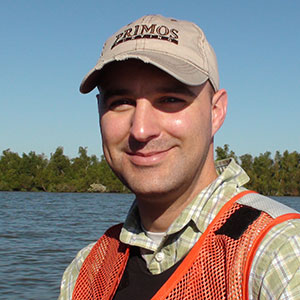
Preventing workplace injuries and reducing workplace hazards in the nation’s most dangerous industry, commercial fishing, are top priorities for Devin Lucas, a Public Health PhD student concentrating in Environmental and Occupational Health and Safety.
Devin is no stranger to the commercial fishing industry. Coming from a small town about 20 miles north of Anchorage, his family commercially fished for salmon each summer, and when Devin was old enough, he pulled the line himself on the boats.
“Because I have worked in the fishing industry myself, I have a perspective that helps me be more effective at translating my research into practical solutions,” he says.
That research is aimed at helping to prevent fatal work-related injuries in traditional high-risk occupations such as commercial fishing.
“I believe that all workers have the right to earn their living in a safe and healthy environment,” he says.
Devin has worked at the National Institute for Occupational Safety and Health, or NIOSH, since 2006 where he began as a junior research scientist.

“I share the values that NIOSH has for protecting workers from harm on the job,” he says. “NIOSH emphasizes research to practice, which I feel is the way we can make the biggest impact in the lives of workers.”
After being selected by NIOSH to complete a PhD in Occupational Safety and Health, Devin spent two years on campus at Oregon State University completing coursework and preparing his dissertation.
“The faculty members in the College of Public Health and Human Sciences are exceptional,” he says. “Their expert instruction and mentoring have been the highlights of my time at OSU. I have grown and benefited in many ways from my interactions and relationships with all my professors.”
For his second-year project at Oregon State, Devin studied personal flotation device (PFD) use among fishing industry workers in Alaska. His research identified the factors associated with high PFD use.
Now back at his office at NIOSH in Anchorage, Devin says he misses the academic environment at OSU.
“The CPHHS PhD program has met all of my expectations and helped me develop the advanced skills I need to improve my research activities. It’s been a fantastic experience.”
Devin and his colleagues were recently awarded the NIOSH Bullard-Sherwood Research-to-Practice Award, which recognizes outstanding efforts by its scientists and their partners in applying occupational safety and health research to prevent work-related injury, illness and death.
“For me, receiving the award is a validation of the importance of the work I do and of the impact we are having on workers,” he says.
Devin and his research team focused on preventing worker fatalities caused by falling overboard from fishing vessels. They studied the problem to identify high-risk groups and contributing factors.
“We identified an intervention and have worked to understand the barriers for widespread implementation,” he says. “We are currently working on several projects that are using the results of our research to address workers’ concerns about PFD use.”
Recently published:
Devin Lucas’ research on fatal and nonfatal injuries involving fishing vessel winches was published in March in the Centers for Disease Control and Prevention’s Morbidity and Mortality Weekly Report.
Fatal and Nonfatal Injuries Involving Fishing Vessel Winches 2013 (pdf)
Real-life incidents are what drives Devin’s research, continually motivating him to make a difference in this high-risk industry.
“Recently, a 15-year-old boy was crushed to death in a deck winch while working on a Louisiana shrimp boat,” he says. “It’s such a horrific end to a young worker’s life and is a great tragedy that should be unacceptable in our society. My goal is to engage workers in high-risk industries to find and implement solutions to safety problems.”
Devin is currently working on his dissertation, an epidemiologic study of work-related injuries on large factory trawlers and longliners operating in the Bering Sea.
He’ll be assessing the efficacy of a U.S. Coast Guard program aimed at improving safety on those fishing vessels.
He chose this topic because of the immediate practical value to the fishing industry and Coast Guard.
“This fleet of vessels has suffered several major vessel disasters in the last decade, with more than two dozen deaths,” he says. “Interventions are badly needed to prevent further loss of life.”
Devin says the results of his dissertation will help guide the development of similar programs for other commercial fishing fleets across the country to ensure that they have the greatest impact on safety.
He currently is assigned to a program at NIOSH that works to prevent occupational injuries in the commercial fishing industry and plans to stay at NIOSH to conduct research aimed at making meaningful improvements in worker safety.
“I hope that my research will help workers stay safe on the job and come home in one piece,” he says.